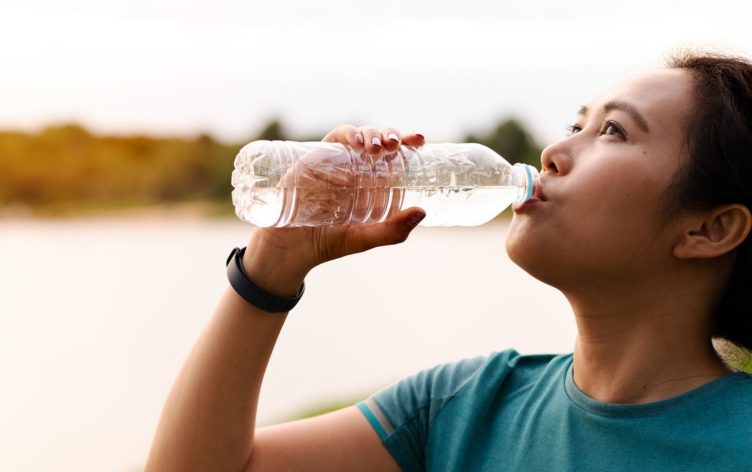
How Much Water Should You Actually Drink?
You hear all the time how important it is to stay hydrated. Water makes up 60% of our body weight, and it’s crucial for digestion, waste removal, temperature regulation, and brain function.
Water is vital to life and the most important ingredient when it comes to your health!
WHY WATER IS IMPORTANT
Essential for proper kidney function, water is found in every cell, organ and tissue. When you don’t take in enough water you can become dehydrated. Dehydration is a serious threat to our system, disrupting the function of many bodily processes. Being even a little dehydrated can lead to symptoms like:
- Dizziness/lightheadedness
- Fatigue
- Dry mouth, eyes and lips
- Headaches
- Joint pain
- Decreased strength, power and endurance during workouts
- Constipation
HEALTH BENEFITS OF WATER
OPTIMIZES DIGESTION
Water is needed for the production of saliva and the stomach acid needed to properly digest food. It also helps the body absorb nutrients and facilitates the digestion of fiber.
WASTE MAKER
Staying properly hydrated is super important for kidney health. Adequate intake helps us remove waste through sweat, urine production and feces; it also helps to prevent constipation and hard stools. Chronic dehydration may lead to kidney stones and other kidney problems.
INCREASES METABOLISM
Staying hydrated is also good for your waistline! Not only does water help rev up your metabolism, it may help you eat less, too — especially if you have a glass right before a meal. According to research, increasing your water intake can lead to eating less saturated fat, sugar, sodium and cholesterol.
IMPROVES BRAIN FUNCTION
Drink up for optimal brain health! Water makes up 75% of the brain and even slight dehydration (just 2%!) can affect cognitive performance, including memory, focus and mood.
CLICK TO TWEET THIS ARTICLE > It’s important to stay hydrated but how much water should you actually be drinking? A dietitian weighs-in via @MyFitnessPal #myfitnesspal
PROTECTS JOINTS
Proper hydration is essential for joint health. Water helps keep the synovial fluid in your joints healthy, providing nutrition, shock-absorption, lubrication and cushioning. This is why you may feel more joint pain when you’re dehydrated.
CIRCULATION
Water is a key component in blood plasma. Proper hydration improves blood oxygenation, immune function and athletic performance. Starting any kind of cardiovascular exercise under-hydrated can reduce your strength, power and high-intensity endurance.
HOW MUCH WATER SHOULD YOU DRINK
According to the National Academies of Sciences, Engineering, and Medicine, women should get 73 ounces (2.12 liters) and men should get 100 ounces (3 liters) of water per day.
But this is just a guideline. You’ll need to drink more water if you’re exercising strenuously for a long time, especially outdoors in the heat. You’ll also need more water if you work (or play!) outdoors in hot temperatures.
Not a big water fan? Food can help you to reach your water goal, too. Most fruits and vegetables have a very high water content (hello, watermelon!) and can easily count for half your intake if you plan it right!
PRODUCE HIGH IN WATER CONTENT
- Cucumber
- Tomatoes
- Watercress
- Watermelon
- Celery
- Apples
- Romaine and other lettuce
- Zucchini
5 WAYS TO STAY HYDRATED
- Drink a full glass of water first thing when you get up in the morning.
- Make a smoothie for breakfast.
- Carry a refillable water bottle with you. Make it a goal to refill one full bottle for each meal.
- Not a fan of plain water? Try club soda, soda water or a water infusion bottle.
- Have a big salad for lunch or dinner.
THINGS TO KEEP IN MIND
Keep an eye on your urine color. This is usually a good indicator of hydration level. If you’re urine is a pale yellow color, that’s a good indicator you’re well hydrated. If your urine is thick and dark yellow, you’re likely not drinking enough. Caffeinated beverages like coffee do count as part of your daily intake, but remember, they can also be diuretics, making you lose water faster than you need to. So drink a little extra water to make up for the dehydrating effect of caffeinated drinks.
THE BOTTOM LINE
Water plays a major role in many important systems and bodily functions. If you want to feel your best, stay sharp, keep your metabolism humming, and perform well athletically — keep your water intake up throughout the day and compensate, as needed.





